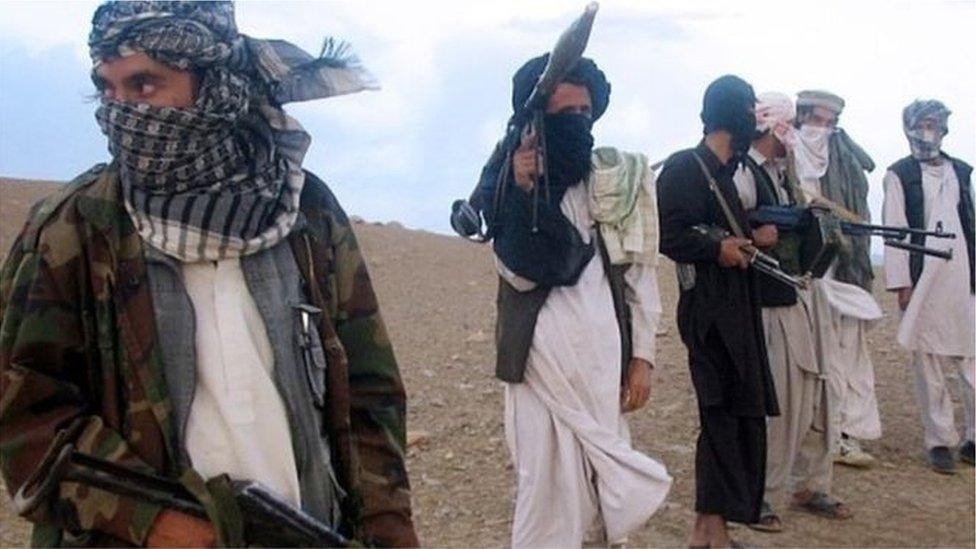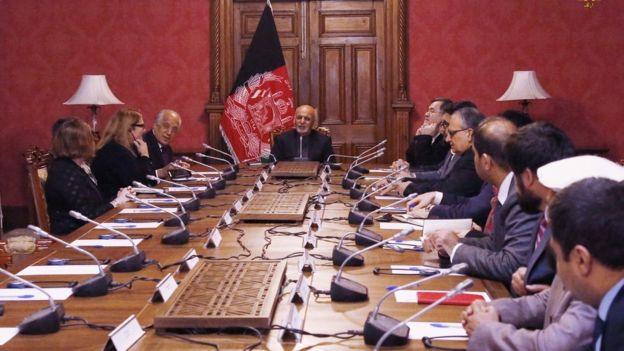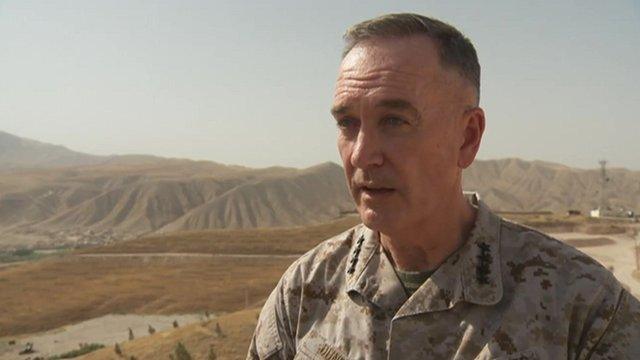Pentagon 'wanted to pay for Taliban travel expenses'
- Published

The Taliban now control more territory in Afghanistan than at any point since 2001
The Trump administration wanted to reimburse the Taliban for their expenses attending recent peace talks, according to a congressional aide.
But a Capitol Hill committee denied the request to cover the militants' costs such as food and lodging, a lawmaker's spokesman told the BBC.
It was rejected because it would have amounted to support for terrorists.
The Pentagon confirmed it "requested the authority to use funds to facilitate [the] meetings".
Since October 2018, the US government has held six rounds of peace negotiations with the Taliban in Qatar's capital, Doha, aimed at paving the way for a safe US exit from Afghanistan.
The funding requested by the Pentagon was intended to reimburse the group for costs incurred while participating in the talks, including supplies, food, accommodation and transportation, according to Kevin Spicer, spokesman for Representative Peter Visclosky of Indiana.
Is peace with the Taliban possible?
"The Defense Department requested fiscal year 2020 funding to support certain reconciliation activities, including logistic support for members of the Taliban and, in March 2019, they sent a notification letter to the Committee on using fiscal year 2019 funds for similar activities," Mr Spicer said.
On Wednesday, the House Appropriations defence subcommittee, chaired by Mr Visclosky, approved a $690.2bn (£617.4bn) spending bill that specifically prohibits reimbursing expenses for the militants.
None of the funds made available by the bill may be used "to pay for the expenses of any member of the Taliban to participate in any meeting that does not include the participation of members of the Government of Afghanistan or that restricts the participation of women", the legislation said.
Mr Visclosky included the provision because the request for funding would violate laws concerning material support for terrorist groups, said Mr Spicer.

Mr Khalilzad, the US Special Representative for Afghanistan Reconciliation (back left) briefed Afghan President Ghani (centre) in January about the talks.
He cited "the Taliban's ongoing offensive operations against US service members, and their continuing lack of acknowledgement of the government of Afghanistan or the rights of women in Afghan society".
"Following the June 2018 ceasefire in Afghanistan, the Commander of U.S. Forces, Afghanistan requested the authority to use funds to facilitate meetings between the Afghan government and insurgent groups looking to implement local ceasefires in order to be poised to take advantage of further opportunities to reduce levels of violence in the country should such opportunities present themselves," said Cdr Rebecca Rebarich, Pentagon spokeswoman.
The Department of Defense submitted a related legislative proposal for the 2020 fiscal year, Cdr Rebarich said.
An independent government spending watchdog told Rollcall, external, which first reported the Pentagon request, that it was reminiscent of a headline from a satirical news website.
Steve Ellis, of Taxpayers for Common Sense, said it was like "life imitating The Onion".
The peace negotiations come as the US government considers a possible exit plan from the longest war in its history.
The talks have focused on a safe withdrawal of US troops from the country in return for the insurgents guaranteeing that Afghan territory would not be used by foreign militants, or pose a security threat to the rest of the world.
The Taliban - which once harboured Osama Bin Laden - has said they will not agree to a ceasefire until foreign forces are withdrawn from Afghanistan and have rejected the Afghan government as "a US-imposed puppet regime".
More civilians were killed last year in Afghanistan than at any time since records have been kept, with 3,804 civilians losing their lives.
More than 2,400 American troops have lost their lives and continue to die in the conflict.
- Published18 June 2013

- Published12 June 2013

- Published19 April 2019